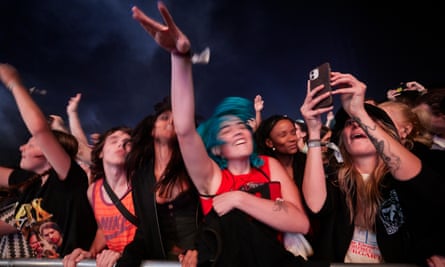Set on the front meadow of the Irish Museum of Modern Art, minutes from the Guinness brewery, it is no surprise the first wave of tickets for Dublin’s Forbidden Fruit festival sold out within days.
The line-up – a heady mix of veterans, newcomers and nostalgia acts – is one of many festivals currently being announced for next summer. “We’ve got Nelly Furtado, who hasn’t played in Ireland for 24 years, Bicep and Barry Can’t Swim, who’s from that generation of artists with ironic names that audiences love” says festival booker Will Rolfe.
But behind the scenes, he says, it’s been a “real challenge”. The festival confirmed 90% of its first-choice artists, but that is rare. “The industry is struggling with a shortage of top headliners. The biggest and best artists are doing their own tours rather than festivals because it’s more lucrative.”
Forbidden Fruit is not alone. Festival organisers are reporting that the UK is no longer an appealing destination for global headline acts. With huge numbers of green spaces being given the go-ahead to hold events, organisers say there are struggling to find bands to fill them, and Brexit border delays are making matters worse.
Securing US acts is especially difficult. Many American shows operate a “dynamic” ticketing model, where the cost adjusts according to demand. As a result, prices can be astronomical. US tour tickets for Bruce Springsteen can go for several thousand dollars. For Taylor Swift, it is just shy of $900. Although an A-grade festival headliner in the UK can expect a fee of £2m-plus, financial expectations for US acts are far greater than this.
There will always be exceptions for artists who just want to do the show, such as Glastonbury, or who want the exposure and understand there is a fee difference. “Some will make less money and be OK with that,” says Rolfe.
The fear is that the UK is becoming irrelevant. “The UK just isn’t an attractive offer at the moment,” says Sacha Lord, co-founder of Parklife festival and night-time economy adviser for Greater Manchester. “When you’re booking these huge global artists, you’re competing with the rest of the world. It’s really tough out there.”
Noah Ball, programmer for Dorset’s We Out Here festival and Cross The Tracks in Brixton, says getting headliners locked in is trickier for next summer than it has been in previous years. “The cost of events has gone up 30-40% over the last few years. It was always a risky business and it’s become even riskier. It’s very important for events to hit the nail on the head and really get the line-up right.”
Artists may be asking for more money, but it is more expensive than ever for them to tour, says Claudio Lillo, booking agent for A$AP Rocky, Playboi Carti, Priya Ragu and Ezra Collective: “Festivals are saying they don’t have the budget, but artists’ costs have increased too.”
The amount of stagecraft expected is also rising. For big headliners, such as Lana Del Rey, it is not just dancers and back-up singers. There are choreography, screens, filming, production and rehearsal costs. For electronic artists, lasers and lights are just the start. It can cost tens, if not hundreds, of thousands just to get on stage. At a new 15,000-capacity venue in London, the talent and production and overall spend is in the tens of millions.
Brexit has also made matters worse. In the past, playing in the UK would be part of a European tour. “You might do Brussels one night, Paris the next and then Manchester two nights later,” says Lord. But now no one can risk equipment being held at the border. “If that happens you’re going to lose your headliners. It’s caused major issues in the industry.” On top of this, being paid in sterling is “not great”, he says.
after newsletter promotion
Kelly Wood, national organiser for live performance at the Musicians’ Union, says there just “aren’t as many acts coming”. They have to factor in time for travel checks and it’s putting people off, she says. Promoters are instead looking to homegrown talent or working more collaboratively with joint offers to make it appealing.
Another factor is that cash-strapped councils are hiring out their green spaces to festivals and there are simply not enough big headliners to fill the huge number of events on offer. Luke Huxham, director of development and place for London’s and Drumsheds, thinks next summer will be competitive in an “unprecedented” way. “A lot of promoters are competing to book the same artists.”
Sarah McBriar, founder and creative director of AVA festival in Belfast, which is in its 10th year, says people still want to go to festivals and their tickets sell quickly, but the weekend they are on at the end of May, there are now “four or five others at the same time”.
Although electronic star Fred Again has managed to go from backroom pop producer to headline the Reading and Leeds festival in a couple of years, for most it takes years of touring to cultivate a fanbase. The problem, says Ball, is festivals want proven ticket-sellers. “There’s a disparity between the number of acts that build to a large scale and the number of events that have capacity for huge crowds.”
One of the big criticisms is that line-ups look similar, but Lillo thinks festival bookers are not taking risks: “They say there aren’t enough headliners, but how are you going to become one unless someone takes a chance on you?”

